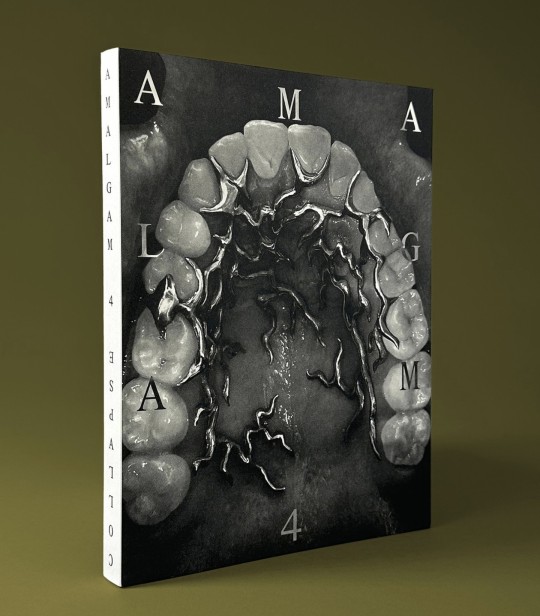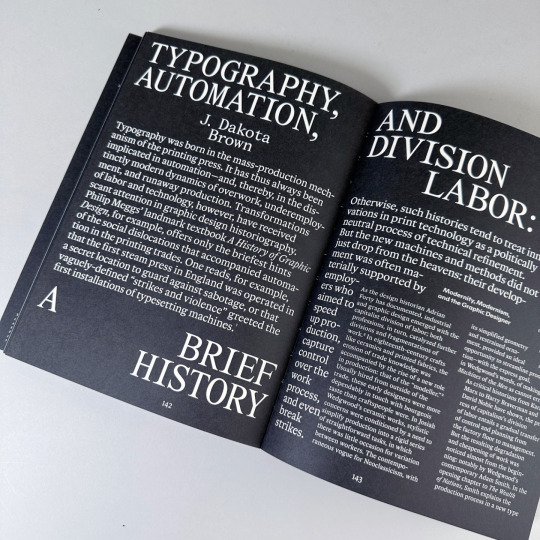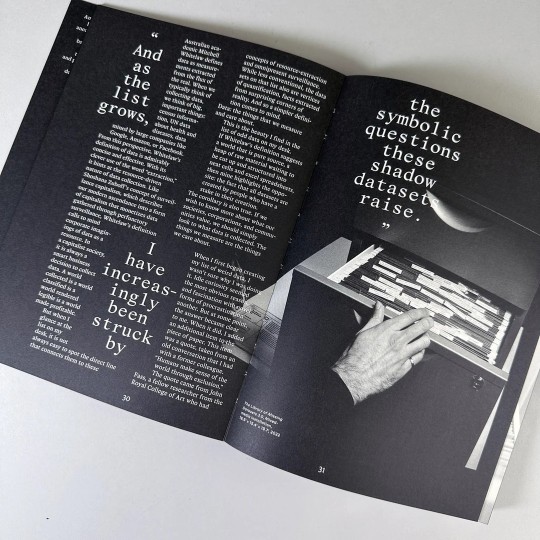#Morehshin Allahyari
Explore tagged Tumblr posts
Text



Amalgam 4 — Collapse
Amalgam #4 points toward the inextricably intertwined relationships between typography, language, and power. In doing so, it assembles a series of essays, anecdotal notes, conversations, and artworks that engage with, hint at, or revolve around the theme of collapse.
From collapse of language syntax, to collapse of semantics, barriers between languages, and language itself, this collection reverberates the material and immaterial conditions, formations, reproduction, and dissemination of power through language and typography. A series of revolutionary headdresses; the auditory and polemic bonds between the letters X, ח, and خ; the interiorities of illegibility; the downfall of the ancient Silk Road patterns; the West Asian Goddesses; an asemic grief; a deliberately missing language; a hearty stutter; and an Aleph that wore a hat to school.
Contributors in this issue include Adrien Flores, JJJJJerome Ellis, Klara du Plessis, Sophie Seita, Luis Camnitzer, Slavs and Tatars, Mimi Ọnụọha, Minh Nguyen, Maia Ruth Lee, Mashinka Firunts Hakopian, Helina Metaferia, Paul Soulellis, Carlos Motta, Lucy I. Zimmerman, Kameelah Janan Rasheed, Paul Benzon, Morehshin Allahyari, Anahita Razmi, J. Dakota Brown, Shabahang Tayyari, Mahan Moalemi, Dennis Grauel, Sasha Wilmoth, Thy Hà, and Alec Mapes-Frances
Designed and edited by Pouya Ahmadi
Published by Amalgam, 2023
Softcover, 200 pages, b&w, 6.5 × 9 inches
Available from Draw Down (online): https://draw-down.com/products/amalgam-4-collapse and from Pouya at this weekend's Boston Art Book Fair!
#Amalgam#Pouya Ahamdi#design journals#typography journals#art and design journal#typography and language#typography and power#Draw Down Books
25 notes
·
View notes
Text
0 notes
Text
Erinnerungskultur, ästhetischer Widerstand, De(kon)struktion und kritische Kanonreflektion – eine Vielzahl an künstlerischen Positionen der Gegenwart verfolgt die kritische Auseinandersetzung mit diesen Themenfeldern. Nora Al-Badri nennt es Technoheritage und entwirft mithilfe eines neuronalen Netzwerks basierend auf mesopotamischen, neosumerischen und assyrischen Artefakten eine Art spekulative Archäologie (Babylonian Vision, 2020). Morehshin Allahyari stellt in Material Speculation: ISIS (2015-2016) Daten ihrer Rekonstruktion der in jüngster Vergangenheit kriegsbedingt zerstörten, antiken Statuen zur Verfügung (The Distributed Monument) und kreiert 3D-gedruckte Miniaturdenkmäler. Egor Krafts Content Aware Studies (2018) basieren auf algorithmisch erzeugten Rekonstruktionen verlorener Fragmente antiker Statuen und Friese. Juan Covellis Speculative Treasures (2020–2022) widmet sich den verschollenen Skulpturen des archäologischen Erbe Kolumbiens und rückt diese aus dem Schatten der Vergessenheit.
Prof. Ursula Ströbele: Digitale Skulpturen gegen das Vergessen (Vortragsankündigung Juni 2024)
see also:
Annet Dekker, Rethinking Future Heritage https://www.youtube.com/watch?v=jy6sBILIl_M
0 notes
Text

Morehshin Allahyari - Material Speculation: ISIS
My series Material Speculation: ISIS is a 3D modeling and 3D printing project focused on the reconstruction of 12 selected statues from the Roman period city of Hatra and Assyrian artifacts from Nineveh that were destroyed by ISIS in 2015 in a series of highly-publicized YouTube videos. The series goes beyond metaphoric gestures and digital and material forms of the artifacts by including a flash drive and a memory card inside the body of each 3D-printed object. Like time capsules, each object is sealed (though accessible) for future civilizations. The information in these flash drives includes images, maps, PDF files, and videos gathered on the artifacts and sites that were destroyed.
0 notes
Text




Morehshin Allahyari. She Who Sees The Unknown.
3 notes
·
View notes
Link
In the summer of 2018, Iranian artist Moreshin Allahyari and Lior Zalmanson, an Israeli artist and scholar, undertook an exhibition at the Art Cube Artists’ Studio in Jerusalem, exploring and manipulating issues of bodies, borders and the limits of individual freedom in the digital era.
Allahyari and Zalmason used the space as a home base for an examination of what it means to exist in a world both limitless—as in a global digital community and highly regulated—within the boundaries of political land-masses, beginning first with Allahyari’s inability to travel to the site of the exhibition because she holds an Iranian passport.
Read more
#the offing#art#morehshin allahyari#lior zalmanson#rendering borders#iran#iranian artist#woman artist#migration#immigration
2 notes
·
View notes
Photo

(via akrales_180307_2106_0045.jpg (JPEG Image, 2040 × 1360 pixels) - Scaled (71%))
5 notes
·
View notes
Video
youtube
Morehshin Allahyari is an Iranian media artist, activist, educator, and curator who uses computer modeling and digital fabrication techniques to explore the intersection of art and activism. “I want my work to respond, resist, and criticize the current political and cultural situation that we experience on a daily basis,” she explains. Allahyari’s Material Speculation: ISIS, a digital fabrication project that inspects petropolitical and poetic relationships between 3D printing, oil, techno-capitalism, and jihadism, has achieved wide acclaim for proposing 3D printing technology as a tool both for resistance and documentation. The many publications featuring the work include the New York Times, Huffington Post, Wired, NPR, Rhizome, Hyperallergic, Dazed Digital, and VICE. She has exhibited at numerous institutions and festivals throughout the world, including Centre Pompidou, Paris; Museum of Applied Arts and Sciences, Australia; Hartware MedienKunstVerein and Transmediale in Germany. Allahyari was recently awarded a 2016 Sculpture Award from the Institute of Digital Art. Allahyari relocated to the United States in 2007 and currently lives in New York.
0 notes
Video
vimeo
She Who Sees The Unknown, Ya’jooj Majooj - Moreshin Allahyari
1 note
·
View note
Photo

Inspiring interview with Morehshin Allahyari, similarly engaged with obsessive digital preservation, but from her perspective as a self-exiled Iranian artist and 'additivist'.
Troubled by the assumptions embedded in the heritage objects that humans value, as with the motivations of those who reproduce them in ever greater fidelity, Allahyari uses the tools and grammar of digital heritage to remix Middle Eastern mythologies into absurd new 3D-printed artefacts. And that's just the beginning...
[Facebook]
#Morehshin Allahyari#3d additivism#digital heritage#interview#Iran#Iranian art#mythology#middle east#3D Printing
5 notes
·
View notes
Video
vimeo
Morehshin Allahyari and Daniel Rourke, The 3D Additivist Manifesto, 2015
1 note
·
View note
Photo

Metahaven, Information Skies, 2016 On view from 09.02.2020 as part of the exhibition “Rhizomatic Spell,” curated by Eva Skopalová, alongside Morehshin Allahyari, Tauba Auerbach, Boris Ondreička, and Suzanne Treister. Kvalitar Gallery, Prague Czech Republic
10 notes
·
View notes
Photo


#2 (top) Marvels of Creatures and Strange Things Existing (translated) by Zakariya al-Qazwini; (bottom) Ya’jooj Ma’jooj by Morehshin Allahyari
2 notes
·
View notes
Photo

Morehshin Allahyari, She Who Sees The Unknown: Huma (Gif from video), HD single channel video, 2016, Courtesy the artist
3 notes
·
View notes
Photo

The 3D Additives Cookbook
http://additivism.org/cookbook
It reveals making use of ideas already shared in the so called Anarchistic Cookbook by William Powell back then in the 70s .
find it here: https://uniteyouthdublin.files.wordpress.com/2015/01/anarchist-cookbook-william-powell.pdf
#kopimi#share#transmediale#hkw#berlin#3d#additivist#cookbook#morehshin allahyari#daniel rourke#feb2017
0 notes

